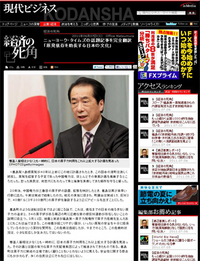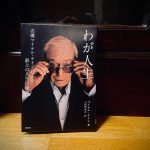「Nuclear Dependency」⇒「原発依存」~New York Times
 震災以降、海外のメディアで日本のニュースが取り上げられる機会が増えました。
震災以降、海外のメディアで日本のニュースが取り上げられる機会が増えました。
地震や津波という特異な国が遭遇した天災のニュースだけでなく、原発事故という多くの国々が深くかかわって来ている情報が含まれているからなのかもしれません。
また英語での日本のニュースが増えるのに比例して、それを翻訳するメディアもよく目にするようになりました。出版社やボランティアで和訳を掲載されている翻訳家の方々、また、こつこつと英語の勉強をのために和訳をブログに掲載している方もいらっしゃいます。上手い和訳文は、原文とあわせて読んでみると、ボキャブラリーや翻訳の勉強になりそうですね。
こちらは、5月31日にNew York Timesに掲載され話題になった記事です。
▽ In Japan, a Culture That Promotes Nuclear Dependency
そして、この記事を現代ビジネス社が完全翻訳をしてくれました。
▽ ニューヨーク・タイムズの話題記事を完全翻訳 「原発依存を助長する日本の文化」
さすがプロの翻訳。和文自体がスムースで、読みやすいです。ぜひ、全文を読み比べてみてください。
[原文/抜粋](New York TImes)
“In many cases, what you’ll see is that a town that was depopulating and had very little tax base gets a tremendous insurge of money,” said Daniel P. Aldrich, a political scientist at Purdue University who has studied the laws.
As the subsidies continue to decline over the lifetime of a reactor, communities come under pressure to accept the construction of new ones, Mr. Aldrich said. “The local community gets used to the spending they got for the first reactor ― and the second, third, fourth, and fifth reactors help them keep up,” he added.
(中略)
According to Professor Shimizu of Fukushima University, Fukushima Daiichi and the nearby Fukushima Daini plants directly or indirectly employed some 11,000 people in communities that include Futaba ― or about one person in every two households. Since 1974, communities in Fukushima Prefecture have received about $3.3 billion in subsidies for its electrical plants, most of it for the two nuclear power facilities, Mr. Shimizu said.
Despite these huge subsidies, most given in the 1970s, Futaba recently began to experience budget problems. As they did in Kashima, the subsidies dwindled along with other revenues related to the nuclear plant, including property taxes. By 2007, Futaba was one of the most fiscally troubled towns in Japan and nearly went bankrupt. Town officials blamed the upkeep costs of the public facilities built in the early days of flush subsidies and poor management stemming from the belief that the subsidies would remain generous.
▽ ニューヨーク・タイムズの話題記事を完全翻訳 「原発依存を助長する日本の文化」
 [翻訳文/抜粋](現代ビジネス)
[翻訳文/抜粋](現代ビジネス)
「多くの場合、人口減少で税を課せる人口が少ない町は、喉から手が出るほど金がほしくなってきます」と、電源三法を研究したパーデュー大学の政治学者ダニエル・アルドリッチが言う。
原子炉の寿命と共に交付金が減り続けると、自治体は新しい原子炉建設を受け入れる圧力にさらされる。アルドリッチが言う。「地元自治体は最初の原子炉から得た金の使いっぷりに馴染み、そして2番目、3番目、4番目、5番目の原子炉が同じ金の使い方を続けさせるのです」
(中略)
福島大学の清水教授によると、福島第1原発と近くにある福島第2原発は、直接間接に1万1千人の人々を双葉町を含む自治体で雇用した。これは2世帯にからおよそ一人の割合になる。1974年以降、福島県の自治体は、発電所に33億ドル(2640億円)の交付金を受けていて、その大部分が二基の原発施設向けである、と清水教授は言う。
主に1970年代に受け取った、これらの巨大な交付金にもかかわらず、双葉町は最近予算問題に悩み始めた。鹿島同様、原発関連の財産税などの他の収入といっしょに交付金が漸減した。2007年までに双葉町は、日本でももっとも財政的に問題を抱える町の一つとなり、ほとんど破産状態となった。町の職員は、景気のいい交付金で建てられた公共施設の維持コストと気前のいい交付金がいつまでも続くと信じた貧弱な経営を非難した。
・gets a tremendous insurge of money
喉から手が出るほど金がほしくなってきます
・subsidies
交付金
・one of the most fiscally troubled towns
もっとも財政的に問題を抱える町の一つ
・ nearly went bankrupt
ほとんど破産状態となった
・poor management stemming from the belief that the subsidies would remain generous.
気前のいい交付金がいつまでも続くと信じた貧弱な経営
等など、参考になる表現がたくさんありました。


















